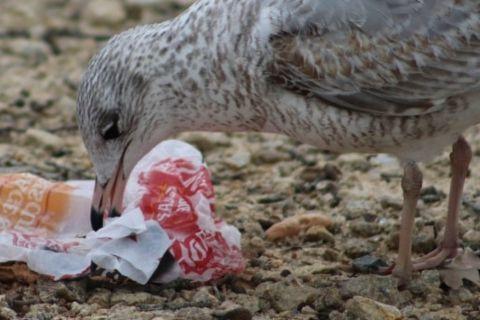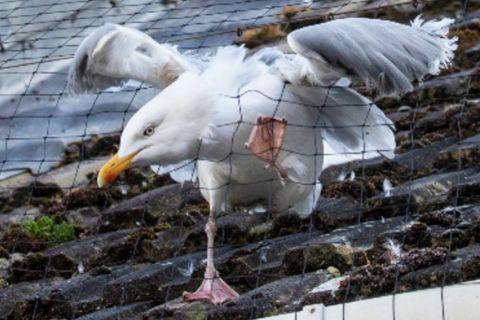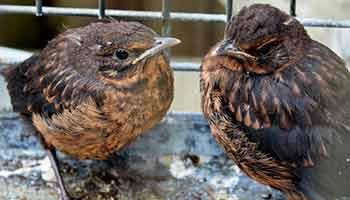Gull deterrents
Despite the iconic status of gulls or "seagulls" as part of the British seaside, public opinion is divided about them.

How to keep gulls away
Gulls territorial calls can be very noisy early in the morning and nesting on buildings can cause concern. They're also known to swoop down on people and steal food. However, these behaviours all have natural explanations and can be managed with a little care and understanding.
Sadly, every year we receive calls about gulls that have been persecuted and the victim of abusive attacks. Many are physically attacked, others are left homeless after their nests are illegally destroyed and large numbers are the target of people shooting at them with airguns.
Stop gulls nesting on your roof
The best way to stop gulls nesting on your roof is by making preparations in the winter to limit the opportunity for them to settle there during the breeding season. If gulls on your roof disturb you, or you're worried they may block a gas flue, you can prevent them from nesting there in the first place.
Gulls make the most noise between May and July when they're breeding. It's best to leave them alone during this time until the breeding season is over, then take preventative action so they don't return.
Gulls' nests are protected while they're being built or in use. It's an offence to restrict access to a nest that is being used unless you're acting under licence.
Natural England and Natural Resources Wales have both produced advice documents on how to discourage gulls from roosting or nesting in an area

Stop gulls from stealing your food
Snatching food is a behaviour that gulls have learnt, and it's reinforced every time they're fed by the public. Try to avoid feeding any gulls, keep your food to yourself and, where possible, try to use re-sealable food containers or something that will close.
Littering will encourage gulls
Avoid giving young children loose food like crisps or chips if you notice a large number of gulls around. Always pick up any litter, as rubbish on the floor will always attract gulls. When disposing of litter, put it in gull-proof litter bins rather than leaving it in bags or crates of rubbish where gulls can access the food. Gull-proof bins are easily acquired, cheap and very effective - some councils have also started using hessian bags, as gulls can't peck through these to get to food waste.
Prevent gulls from attacking you
Gulls that swoop suddenly on people or pets are usually trying to protect chicks that have fallen out of or left the nest. They'll stop when the person or animal has moved away from their young. This behaviour usually only lasts for a few weeks until the chicks have fledged and are able to protect themselves.
Keep your distance
The best thing to do is keep your distance from any gull nests, or chicks that you see on the ground. If you can't avoid walking close to them, then holding an open umbrella above your head will help deter the parents from swooping.
Is it illegal to cull or kill gulls?
Under the Wildlife and Countryside Act 1981, gulls can't be killed unless they're being controlled under the terms of licences issued by Natural England or Natural Resources Wales. Wherever possible, we'd always prefer non-lethal solutions and believe that culls should only be considered if there's a serious problem.
For example:
- To protect public health and safety
- To preserve air safety
- To protect other wild birds
- To prevent serious damage to agriculture
- However, it remains illegal to do anything that will cause unnecessary suffering to the birds and the conditions specified on each licence must be followed.



